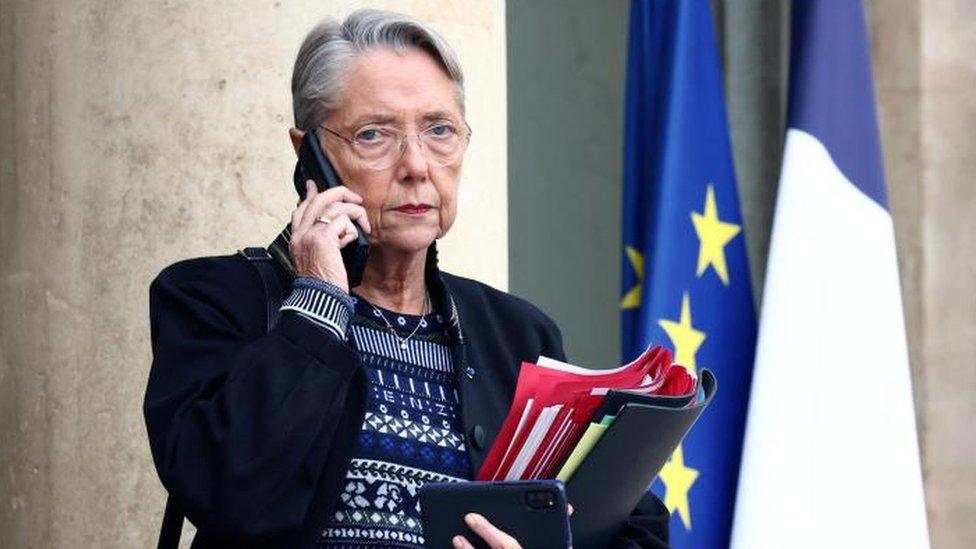Gabriel Attal: Macron's pick for PM is France's youngest at 34
- Published
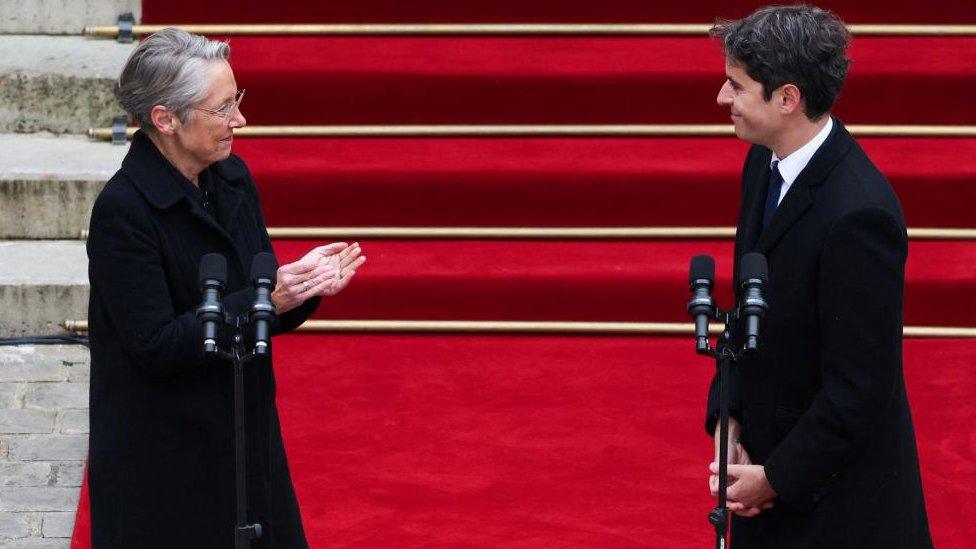
Gabriel Attal succeeded Élisabeth Borne on Tuesday during an official ceremony at the prime minister's residence
Gabriel Attal has been named France's next prime minister, as Emmanuel Macron aims to revive his presidency with a new government.
At 34, he is the youngest PM in modern French history, outranking even Socialist Laurent Fabius who was 37 when he was appointed by François Mitterrand in 1984.
Mr Attal replaces Élisabeth Borne, who resigned after 20 months in office.
Throughout that time she struggled with a lack of a majority in parliament.
Gabriel Attal, who is currently education minister, certainly makes an eye-catching appointment.
He will now have the task of leading the French government into important European Parliament elections in June.
His rise has been rapid. Ten years ago he was an obscure adviser in the health ministry, and a card-carrying member of the Socialists.
He will also be the first openly gay occupant of Hôtel Matignon. He was previously in a civil partnership with another Macron whizz-kid, the MEP Stéphane Sejourné.
Welcoming him to his new role, President Macron wrote on social media: "I know I can count on your energy and your commitment to implement the project of revitalisation and regeneration that I announced."
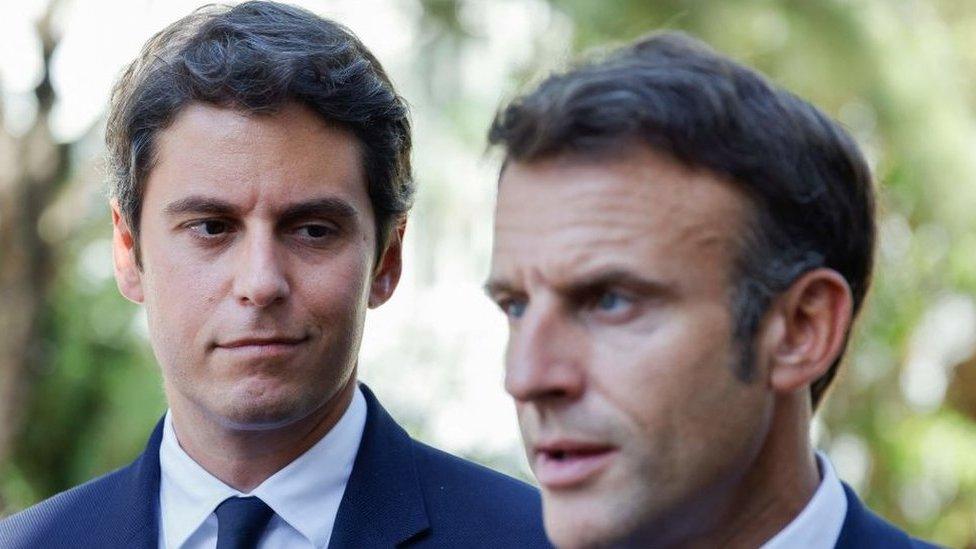
Gabriel Attal (L) has the task of leading the government into European Parliament elections in June
"France will never rhyme with decline, France rhymes with transformation, France rhymes with audacity," Mr Attal declared outside his new residence.
But given the difficulties of the president's second term - and the growing challenge from the nationalist right - is "eye-catching" alone going to cut it?
Handsome, youthful, charming, popular, cogent, Mr Attal certainly comes to office trailing clouds of glory - much, let it be said, like his mentor and role-model the president himself.
But like many go-getters of his generation, he was inspired by Emmanuel Macron's idea of breaking apart the old left-right divide and re-writing the codes of French politics.
In the wake of Macron's 2017 election, Mr Attal became a member of parliament, and it was there that his brilliance as a debater - easily the best of the neophyte Macronite intake - brought him to the president's attention.
At 29, he became the youngest ever minister in the Fifth Republic with a junior post at education; from 2020 he was government spokesman and his face began to register with the voters; after President Macron's re-election, he was briefly budget minister and then took over at education last July.
It was in this post that Mr Attal confirmed to the president that he has what it takes, acting with no-nonsense determination to end September's row over Muslim abaya robes by simply banning them in schools.
He led a campaign against bullying - he himself was a victim, he says - at the elite École alsacienne in Paris, and took on the education establishment with his proposal to experiment with school uniform.
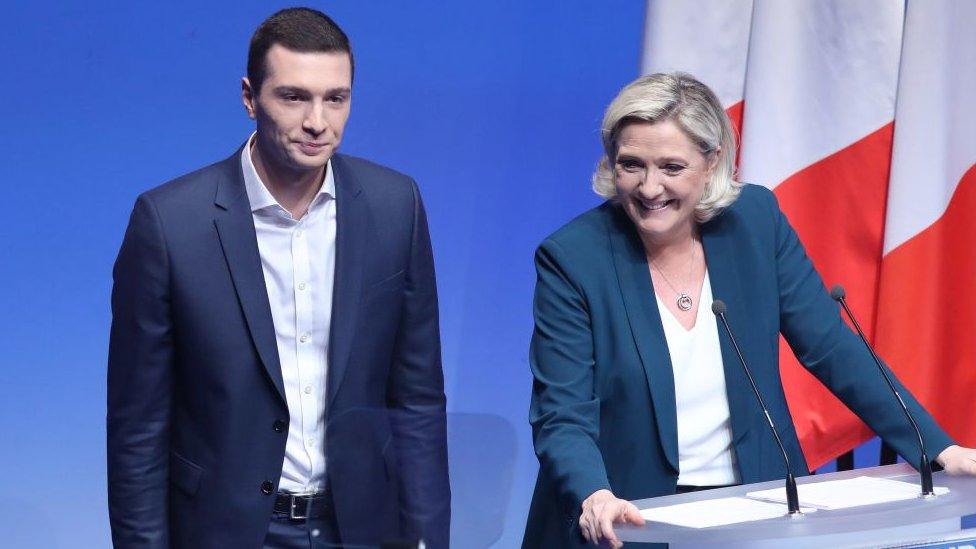
President Macron's party faces a strong challenge from National Rally and its young leader Jordan Bardella - as well as Marine Le Pen
And, all the while, he managed to buck the normal trends by actually becoming popular among the public.
Polls show that he is by far the most admired member of the Macron government - competing at the same level as the president's main enemy, the nationalist Marine Le Pen and her youthful colleague Jordan Bardella.
And there, of course, is the heart of it.
By drawing Gabriel Attal from his pack of ministers, Mr Macron is using an ace to outplay the queen and her jack. But will it work?
The drawn-out process of naming him - everyone knew a reshuffle was coming but it took forever - shows that if President Macron is well aware of the weakness of his current position, he has also been in deep uncertainty over how to address it.
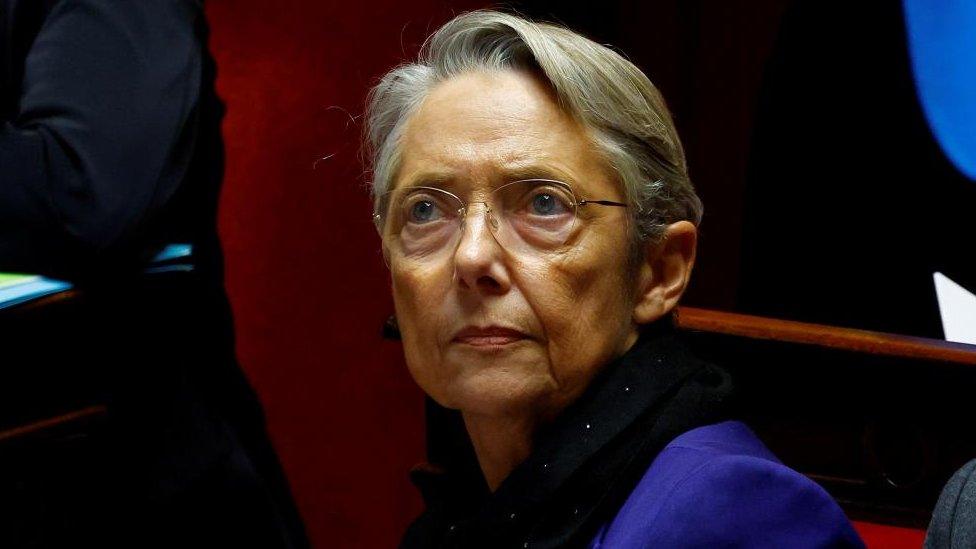
Mr Attal replaces Élisabeth Borne but is likely to face the same problems she had without a majority in the National Assembly
More than one commentator has made the obvious point that what the public wants above all now is not so much a rearrangement of faces at the top, but a new sense of purpose to the Macron presidency.
But as things stand, Mr Attal will face exactly the same problems as did his long-suffering predecessor Élisabeth Borne.
These are: a hard-right opposition that is surging in popularity and looks set to win easily in June's European elections; a National Assembly with no in-built majority for the government, making every new law a struggle; and a president who seems unable to define what he wants his second term to achieve.
On top of which, the new prime minister will have a problem all of his own - which is establishing his authority over such heavyweights as Gérald Darmanin and Bruno Le Maire.
And what is the plan, some are also asking, if as seems likely Mr Macron's party loses heavily in the European elections?
Normally that would be the occasion for a prime ministerial replacement, to give a new élan for the second half of the mandate. But, as things stand, that card has already been played, and in the event of a defeat in June Gabriel Attal risks drifting on as a discredited loser.
Even opposition figures recognise that he is a class act. He is respected and liked in the National Assembly.
But there are also questions about what he actually stands for. The suspicion for many is that he is all smiles and verbiage, much like the man to whom he owes his career.
As the president's nominee, he is the wunderkind's wunderkind. But if he is only Macron's mini-me, the marvel could prove a mirage.
Related topics
- Published8 January 2024
